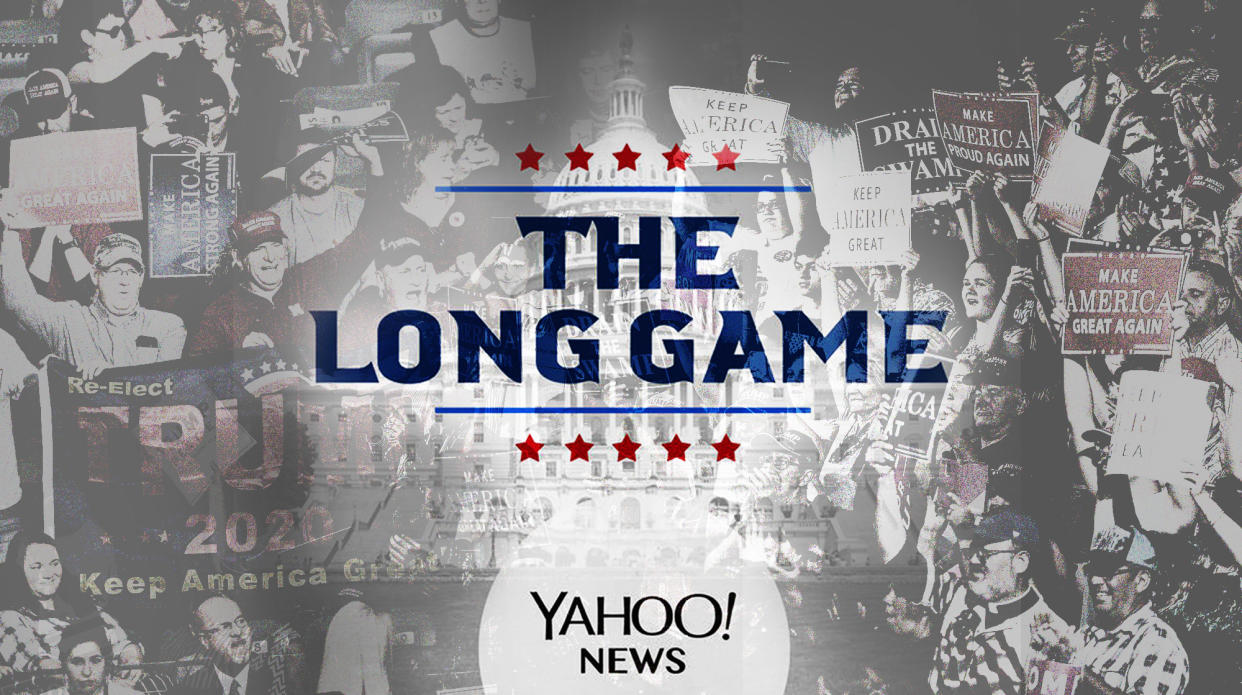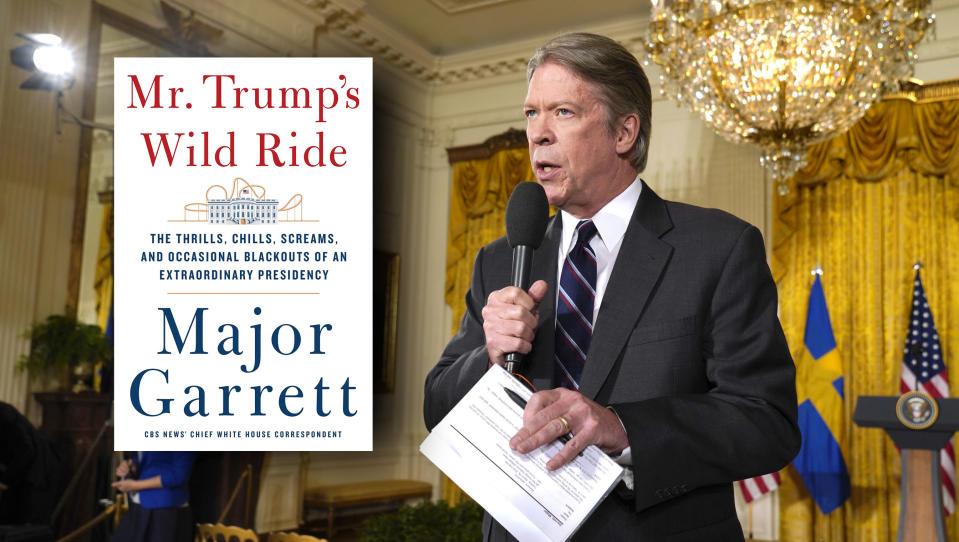In new book, a White House correspondent takes the Trump presidency seriously

Like so many things in American life these days, political conversation can feel more like war than an exchange of opinions. Polarization is so pronounced, especially around anything related to President Trump, that any concession to the other side seems like total capitulation.
But a new book by veteran CBS News journalist Major Garrett — “Mr. Trump’s Wild Ride: The Thrills, Chills, Screams, and Occasional Blackouts of An Extraordinary Presidency” — is that rare thing: an examination of the Trump presidency that keeps its wits about it.
Garrett’s book was released a week after Bob Woodward’s book, “Fear: Trump in the White House,” landed like a bomb in the news cycle. Garrett and his publisher discovered the scheduling conflict last summer only after they had locked in their own publication date, he said during an interview for the Yahoo News podcast, “The Long Game.”
But, Garrett said, “Our books are very different.”
“’Fear’ is about things that sounded scary and didn’t happen. My book’s about what did happen,” Garrett said.
Another major difference is that Garrett takes Trump and his supporters seriously, granting that the president has garnered some accomplishments while also putting those attainments in context, discussing the downsides or caveats involved in them, and holding nothing back in criticism.
Even the title of the book, with its use of the honorific “Mr.” before Trump’s name, is a nod to how Garrett wanted to execute his analysis.
“One of the things I try to do in the book is to make sure the voice of Trump supporters I met during the campaign are in the book,” Garrett told me.
“I wanted the book to do two things in this regard: get out of Washington a little bit, and remind myself and the reader that the voice of Trump supporters matters in this context. They’re not in the book to persuade you if you don’t like the Trump administration or Donald Trump,” said Garrett, chief White House correspondent for CBS News and host of “The Takeout” podcast. “They’re there to illustrate the ideas, the concepts, the thoughts of people who found within Donald Trump something they hadn’t found before and attached themselves to.”
Some Trump critics might read an isolated passage here or there in Garrett’s book and find it to be too solicitous of the Trump point of view. There are many complaints about “false equivalence” or “false balance” in the news these days.
“Trump supporters have never felt emotionally closer to a president. Trump critics can barely breathe, so strangled do they feel by his perceived selfishness, indifference to facts, contempt for institutional norms and haphazard management style,” Garrett writes.
“Perceived?” some will ask themselves.
Or this: “Is Trump a racist? No one can know but Trump,” Garrett writes in a chapter titled simply, “Race.”
You can imagine the groans that will elicit from many Trump opponents and haters.
But this might be the best example of the way that Garrett sets the table for Trump supporters to hear some tough criticisms of their hero. The 14 pages that follow Garrett’s sidestep of the racist question — he defines the term as an attitude or view that one can only see by peering into the soul or mind — contain a devastating critique of Trump on racial issues.
His immigration policy has “inclined toward white European favoritism” and appealed to “a cultural and nostalgic yearning for an earlier, whiter America,” Garrett writes. Trump knew that the Friday night rally around the statue of Robert E. Lee in Charlottesville — the night before violent clashes between white supremacists and protesters — had included Nazi salutes, chants of “Jews will not replace us” and other horrors. Trump “intentionally refused to blame white supremacists,” Garrett writes. And this is “the closest this fringe element had been to political legitimacy and power … since [former segregationist Alabama Gov. George] Wallace.”
“Trump doesn’t know much about the Civil War,” Garrett also writes, and uses terms like “heritage” as “a segregation-era code word … unfurled in common cause with white nationalist sensibilities.” And when Trump rages against those who advocate for removing Confederate statues as wanting to change history, the history he refers to “has been, in the main, a celebration of white, Protestant Christian dominance” which has “sanitized … the institutionalized racial brutality visited upon African Americans and Native Americans”
Not much equivalence there.

And yet the book should be taken seriously by Trump backers, because it approaches his presidency through the lens of his achievements, with a somewhat agnostic view of whether those accomplishments are positive or negative.
“The only goal” of the book, Garrett writes, is to examine the “lasting impact” of Trump’s presidency. He has chapters, many of them steeped in the last two decades of political history and buttressed by exclusive interviews with major players like Senate Majority Leader Mitch McConnell, R-Ky., White House adviser and Trump’s son-in-law Jared Kushner, and Federalist Society President Leonard Leo on the judiciary, immigration, the failure to repeal Obamacare, North Korea, deregulation and tax reform.
Garrett also has a chapter on Trump and Kushner’s relationship with Saudi Arabia and in particular Crown Prince Mohammed bin Salman, which looks quite prescient now with the apparent murder by Saudi agents in Turkey of Washington Post columnist Jamal Khashoggi. Kushner spoke at length with Garrett in the summer of 2017 about his relationship with the prince, who is effectively in control of the Saudi kingdom. Garrett said that after Michael Wolff’s book “Fire and Fury” was released at the beginning of 2018, the White House shut down interviews with senior officials for all book projects, including his own.
Garrett treats Trump as a historic figure, which by default he became once he was the Republican nominee for president. Yet even that kind of fact can feel like a concession to many who recoil at Trump’s debasement of the office. But emotion can often be an obstacle to seeing Trump clearly, and Garrett is adept at clearing away distractions in order to focus.
Trump’s removal of regulations “is the most fundamental shift in 40 years,” Garrett writes. “Most of it you probably missed.”
He goes on to explain how Trump’s administration has been able to remove more regulation than past Republican presidents in large part because Ronald Reagan didn’t have a Congress as far right as Trump has.
And in one of the more remarkable passages of the book, Garrett details a memo from Trump’s own White House budget office, which was basically ignored by the White House itself, that demonstrated that federal regulations provide between three and eight times the amount of economic benefit as they cost the economy. That is an astounding fact, made even more noteworthy by the fact that Trump’s own administration reported it, finding that “regulations can and often do bring order to markets, impose safety discipline and create means by which compliance can be checked and enforced,” in Garrett’s words.
Garrett’s chapter on the passage of tax cuts by Trump and the Republican Congress grants full bragging rights to the GOP for getting it done. But Garrett also explains the ways in which the cuts abandoned fiscal responsibility in a way that experts believe is giving the economy a “sugar high” that is ultimately “completely unsustainable.”
And Garrett’s chapter on Trump’s approach to North Korea does a fantastic job of drawing a connection between the inability of Congress to pass new budgets each year and the way that has hamstrung the Pentagon from making long-term plans, leading to a weakening of our military. And the U.S. military, Garrett concludes, is not the invincible behemoth Trump often brags about, but is rather more vulnerable and overextended than ever before, in large part because of congressional dysfunction.
He does not let Trump off the hook for his total disregard for norms of a constitutional republic and for basic civility.
“One of the most consequential aspects of the Trump presidency [is] its coarsening influence on political dialogue and its effect on our national ability to discuss and communicate about the vital issue of race,” he writes.
Perhaps most refreshingly, Garrett admits that he — an expert on American politics, the presidency and the Congress — has been forced to approach the Trump phenomenon as a student. “When it comes to unlearning that which you have studied for nearly 20 years, I will concede it is more difficult than I imagined,” he writes.
And he acknowledges that trying to focus on substance amid the Trump hurricane has been exceedingly difficult — “like trying to light a candle standing behind a jet engine.” He at one point even describes covering the Trump presidency as a form of trauma.
In an interview for “The Long Game” podcast, Garrett expanded on that: “There have been times when I have woken up on a weekend after a particularly long and taxing week and said to myself, ‘I feel like I’ve been in a couple of car accidents.’ It feels that way,” he said.
But he was also optimistic that “credible journalism always outlasts incredible politicians.” And with his book, he has created space for people of different opinions in this divided time to come together and potentially discuss a set of shared facts.
“We better have a national conversation about this divide, or we’re never going to get anywhere,” he said.
_____
Read more from Yahoo News:
Khashoggi friend says journalist angered Saudi government with column
Facebook accused of conservative bias over Kavanaugh article fact-check
California’s ‘Queen of Green’ fights Trump to set stricter pollution rules
In the new cold war, Western democracies are losing ground to Russia
Photos: Honduran migrant caravan pushes north toward the U.S.
Hear the latest episode of Skullduggery, our podcast on scandals in the Trump era



